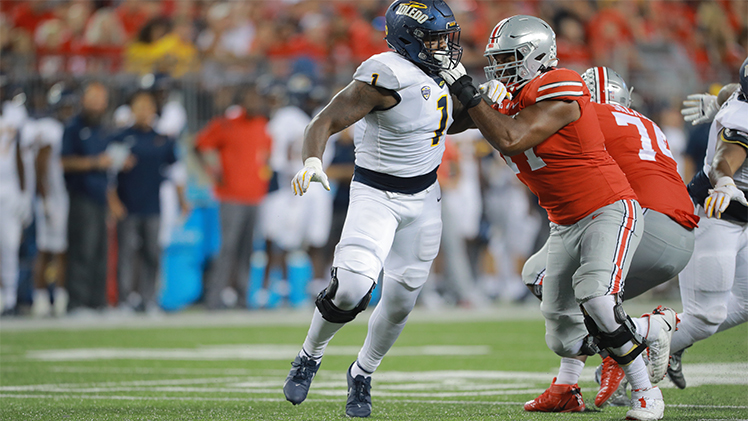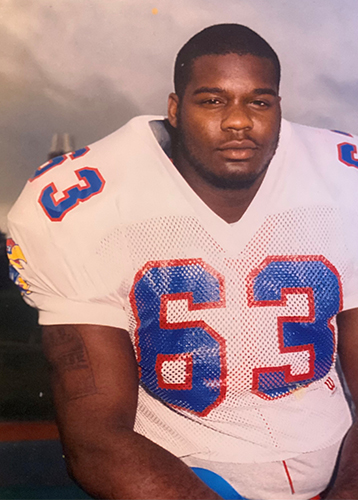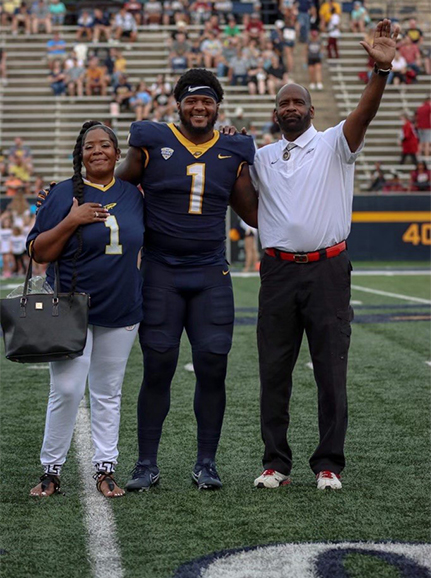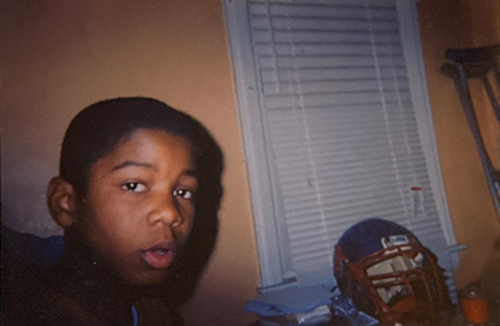Asked by his mother what he wanted for his fifth birthday, Desjuan Johnson was ready with his answer.
“I want,” he said without hesitation, “to play football.”

CELEBRATING SUCCESS: UToledo recognizes the Class of 2022 with a series of stories featuring students receiving their degrees at fall commencement.
Desjuan’s older brothers, Dion and Dejon, were already playing pee-wee football, and young Desjuan was eager to join them. So Lacresia Stegar, a single mother raising five children, dutifully bought young Desjuan all the requisite football gear. Later, she drove him to the local football field for Desjuan’s first practice.
There was just one problem. In the excitement of making his football debut, Desjuan forgot his cleats.
Didn’t matter. He was ready to play.
The coach, Maurice Payne, whom everybody called Coach Mo, noticed the little kid with the big motor, running hard and chasing down the older boys with reckless abandon, cleats or no cleats.
“Hey son!” Coach Mo said, motioning to Desjuan. “What’s your name?”
“Desjuan,” he replied.
“Man, I’m not going to remember that,” Coach Mo responded. He thought for a moment as he looked down at Desjuan’s muddy Timberland boots. “I’m going to call you Boots.”
Thus a lifelong nickname was born.
The boy who began playing football in boots has grown into a man who fills big shoes for the Toledo Rockets, both figuratively and literally (size 14 cleats, for the record, big enough to support his 6-3, 275-pound frame).

Toledo defensive tackle Desjuan Johnson has the same NFL dream as his late father, who played the same position as Desjuan at Kansas from 1996-99.
Where he once chased older boys on the hard-scrabble football fields on Detroit’s east side, he now terrorizes quarterbacks in the Mid-American Conference.
Johnson, who is on course to graduate Saturday, Dec. 17, with a degree in interdisciplinary studies, has earned All-MAC honors three seasons in a row and is considered by many to be a solid NFL prospect.
He has 4.5 sacks this season and leads Toledo with 13.0 tackles for loss, but his stats don’t tell the whole story. Opponents must build their entire offensive game plan around Johnson, who is big enough to clog up the middle as a tackle and fast enough to reach the backfield as an edge rusher.
“He’s the Aaron Donald of the MAC,” said Bowling Green head coach Scott Loeffler.
After Johnson finishes out a stellar college career at the end of this season, he will begin preparing for the NFL Draft, the next step in his dream of playing football at the highest level. It’s a dream shared by many young boys around the country, especially in tough neighborhoods like the one in which Desjuan grew up. It also was the dream of Desjuan’s father, Dion Johnson, a defensive tackle for the Kansas Jayhawks who died tragically in 2004 when Desjuan was just 4 years old.

Desjuan Johnson keeps this photo in his locker of his father, Dion Johnson, from his time as a defensive tackle at the University of Kansas.
Two years before his death, was back in the old neighborhood on Detroit’s east side. He was 23 years old, a couple of seasons removed from his college playing days but still pursuing football glory. He had a solid career at Kansas, his size (6-4, 290) and agility making him a force to be reckoned with for the Jayhawks. He went undrafted but still kept after his goal of playing at the next level by playing a year of professional football overseas. A tryout with the Chicago Bears gave him optimism that perhaps his time had come.
Sadly, fate had other plans.
On the evening of the very day of that tryout with the Bears, May 11, 2002, Johnson stepped out of the family home to run an errand. At some point shots were fired by an unknown person for an unknown reason. Seemingly in the wrong place at the wrong time, Johnson took a bullet to the head.
“He was going to Blockbuster to get some movies,” Dion’s sister Lisa Fields later told a Kansas newspaper. “He heard shots and tried to duck out of the way but he was so big.”
Johnson was rushed to a hospital where his life was saved but he never fully recovered.
“He was totally disabled,” Fields said. “He was in the hospital for a long time. Then he was in rehab.”
Dion Johnson died in his sleep almost two years later, on March 27, 2004.
Among the many mourners at the funeral was 4r-year-old Desjuan.
“I remember going to the funeral with my two older brothers and I remember it felt like a dream,” Desjuan recalled. “I remember everyone crying but I didn’t really know what was going on. It was an open casket. My brothers were crying and touching him. I touched him; I didn’t know what was going on for real, but his body was cold and he didn’t really look the same. After that I knew I would never see him again.”
Desjuan’s mother recalls that day all too well.
“Desjuan, I remember him saying, ‘So this means I don’t have a dad no more?’ It was so heartbreaking,” she said.
Desjuan embarked on life without a father, not unusual in his neighborhood but painful nonetheless. He was girded by the support of his loving mother and the guidance of his grandfather, Roland Stegar.
“My grandpa was a huge help,” Desjuan said. “He helped my brothers, he helped all of us. He was a role model, the male figure in our family since we didn’t have one, letting us know right from wrong and how to approach things.”

Desjuan Johnson with his mother, Lacresia Stegar, and his grandfather, Roland Stegar, on Senior Day at the Glass Bowl earlier this season.
Despite the early tragedy in his life, Desjuan thrived. His mother said she never had to worry about him.
“That’s my baby, that is the one,” she said. “I have four boys and one girl and all of them are like, ‘Why is he your favorite son?’ And I’m like, I don’t have a favorite but if you want to say he’s my least problem child, that’s my way of putting it. I never had problems with Desjuan. He listens, that’s what I like about him. He listens.”
“Growing up on the east side of Detroit, there were challenges every day that you don’t see normally as a kid,” Desjuan said. “I made the best of it. I never tried to look down on the situation I was in. I always kept a smile on my face. Adversity was there every day growing up. With any adversity I face now, I know what to do when you’re going through hard times. Hard times can come like a curveball in life, so you’ve got to know how to handle it and keep going. It was hard growing up, but my family was my backbone. They always kept me on the right path.”
Football also was a key factor in keeping Desjuan on the straight and narrow. As the years went by, Desjuan saw many of his classmates fall victim to the harsh environment of the neighborhood, but he felt his status as a football star gave him a degree of security.
“Football definitely helped to keep me off the streets,” Desjuan said. “But after you leave practice you’re still in that environment. Playing football is no guarantee. So, I just knew how to move and associate myself with the right people. I grew up in a tough neighborhood but everybody still supported me, so I don’t look at it as just the gun violence and stuff like that. You know you’ve got your neighborhood support. It’s only one out of five, one out of 10 high school players who are going to college, so when they knew I had a chance to take it all the way they supported me. That was a huge deal for me.”
Loss has been one of the unfortunate realities of Desjuan’s life. He lost his father at a young age. Growing up, he has lost many of his friends to violence, others to illness. His beloved Coach Mo passed away in his freshman season at Toledo. A year later, Adilli Flinroy, another of Desjuan’s youth coaches, also died. His aunt died from COVID-19 in 2020. A Rocket teammate, Jahneil Douglas, died by gun violence not far from Toledo’s campus in 2020. All of this can take a toll on the even the most resilient of souls.
“Losing a lot of friends is kind of hard because it makes it hard to get close to certain people, to build relationships with new people,” Desjuan said. “Loss after loss after loss, I always showed up to practice, tried to keep a smile and let none of that affect what I do on the field. But you know, it was still kind of hard on me.”
Desjuan’s life experience has made him something of a grief mentor to his teammates. He spent countless hours talking with fellow Rockets in the days, weeks and months following Douglas’ death. Senior linebacker Dyontae Johnson, a fellow Detroiter and close friend, looked to Desjuan for counsel when he lost his father two years ago.
“When I lost my dad, he told me what I needed to hear,” Dyontae said. “How to feel, how to cope with it. I definitely leaned on him.”
Of course the biggest loss of all came long ago, and still has a tremendous impact on Desjuan’s life.

Desjuan Johnson posing with his late father’s Kansas helmet in an undated photo. His family still has the helmet, a reminder of Dion Johnson’s unfulfilled NFL dream.
The memories of his father are few and faded, but still poignant. He remembers putting on his dad’s Kansas helmet when he was 4, his dad playing a game of catch with him, his dad holding him and throwing him in the air. Desjuan keeps a photo of his father – one from his playing days at Kansas – in his locker.
“Every day before I put on my helmet and my cleats, I always see him in his Kansas uniform,” Desjuan said. “It reminds me to keep going and go harder and just try to be the best player or person while I’m still here.
“He played the same position as me. I always try to compare myself and compete against him. He started 31 games at Kansas and led the defensive line with 34 tackles as a senior. He was legit, so I try to tell myself, ‘OK, he was good, let me be great.’ I always try to think about it like that. I’m always trying to be hard on myself about it.”
Desjuan has come a long way on the football field and perhaps even farther in life. He will be the first in his family to receive a college diploma.
He has the respect of his teammates and coaches as a role model of consistency and hard work and is a positive force in the locker room.
“I’m someone who roots for guys who are in situations that aren’t ideal,” said Head Coach Jason Candle. “Watching them grow through tough moments, watching them deal with adversity in a positive way is very fulfilling for me. That puts a smile on my face. Desjuan is getting his college degree in December and leading his team to what we hope is a MAC Championship [on Saturday, Dec. 3]. He’s been at the forefront of our success for the last few years. I’m really proud of him. I’m certainly rooting for him as he moves forward in his career after his football playing days are over at Toledo.”
That day is coming soon, and after the man they call “Boots” hangs up his Rocket cleats for the last time, he will begin putting all of his focus on his ultimate goal: to step into the shoes of an NFL player — footwear his father never had a chance to walk in.
“My dream always started with me trying to be like my dad and follow in his footsteps and be better than him. Walk in his boots, so to speak, and finish taking the steps he couldn’t,” Desjuan said. “When the NFL and stuff started to come into the picture for me, I started to feel like I can really get there. I’ve just stuck with it and kept going.
“The NFL, that’s huge right there. That’s the big dream.”